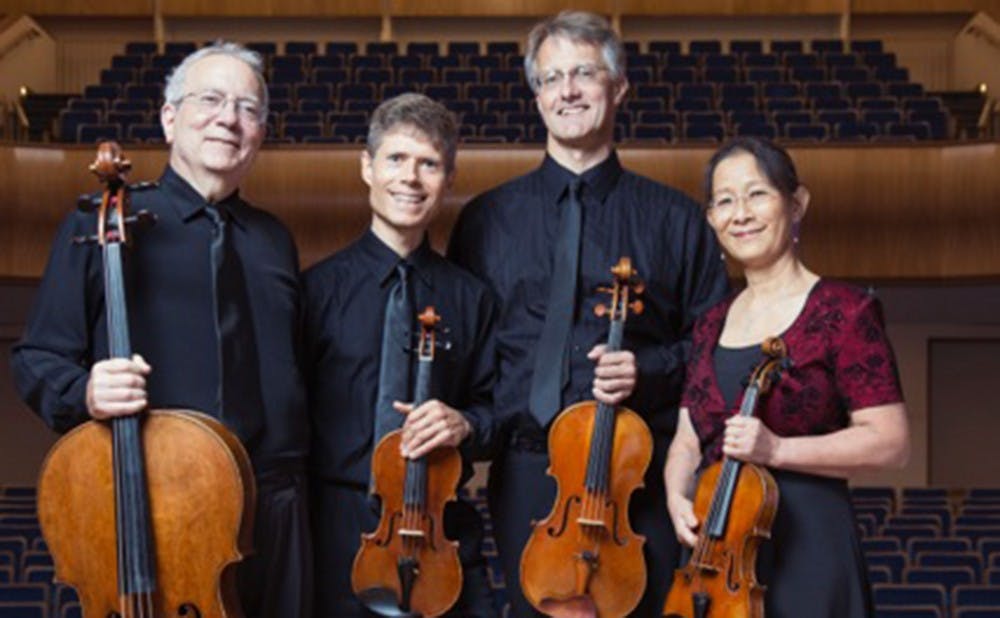If you were a college student in 1965, you may have found yourself with a daisy chain on your head, a peace sign necklace on your chest and a counter-cultural rhythm in your heart. The year 1965 was saturated with political and cultural upheaval, but it was also a time of musical revolution. Bands like The Beatles and The Rolling Stones were making their debuts just as Woodstock beckoned around the corner. The year was also significant in the history of music at Duke—amidst the tumult of rock and roll, a classical string quartet was born.
Founded in 1965 by violinist Georgio Ciompi, the Ciompi quartet burgeoned over the years to reach its current internationally renowned status. Although the group has experienced structural change over its 50-year life, the quartet’s longest involved member Fred Raimi, professor of the practice of music, said he believes Ciompi is similar to how it was when he joined in 1974. Most importantly, its mission remains the same: to grace the world with the gift of classical music.
Currently comprised of four Duke professors of the practice of music— violinists Eric Pritchard and Hsiao-mei Ku, violist Jonathan Bagg and cellist Raimi—the Ciompi Quartet continues to uphold its original mission. In addition to playing concerts throughout the year, the members of the quartet enrich Duke’s community by teaching music to students and immersing themselves in life on campus.
Ku, for example, is a faculty-in-residence in Pegram Dormitory, which is designated as the Performing Arts living and learning community. By living with the students and inviting Pegram residents to play with her weekly, Ku gets to know a variety of Duke’s aspiring musicians. She said that she finds joy in watching students grow and discover their own voices.
“The [students] truly learn music,” Ku said. “They are not just learning how to perfect each piece but how to share their personality or character.”
The Ciompi Quartet launched their performances for this school year with an informal concert in Pegram Aug. 24 that included music from the first and second movement of Debussy’s Quartet. Students who attended the concert agree that the show was an exciting way to start the school year.
“To me, the Ciompi Quartet’s performance was one of the best performances of Debussy’s Quartet. It’s great that we have access to these amazing musicians,” said freshman Yoon Ko. “As a student who wishes to participate … in the chamber music scene, I am grateful to have the Ciompi Quartet living with us and working with the students.”
Beyond the Duke community, the Ciompi Quartet plays on the world stage. In addition to tours in the United States, the quartet has been to a myriad of international venues including some located in Germany, Italy, France, China, England and South America. They also record compositions by contemporary composers.
In their travels, Ciompi has encountered a variety of unusual experiences, including several difficulties. Professor Raimi recounts a time when the group was in Albania about twelve years ago and had to take a bus 75 kilometers. Though this distance is only about 47 miles, Raimi reported, the length of the journey was not proportional.
“It took six and a half hours to get there. The potholes were incredible, and it was actually a [very] dangerous road. We finally got to this town. We were about a half an hour late, and the concert hall was not a concert hall but an [exceptionally cold] room.”
Ultimately, the concert had to be shortened, due to threat of frostbite.
Bagg recalled having difficulty in China with flight scheduling, visas and road blocks.
“Whenever we ran into a road block, Hsiao-mei navigated us through,” Bagg said. “She had a motto, ‘When there is no road, I make one.’”
This slogan became an unofficial mantra for the group.
Despite some travel difficulties, Ciompi Quartet recognizes the importance of spreading their classical music all over the world. Professor Ku, for example, leads a DukeEngage trip to China that is centered around music. She notes that, “People say music is an international language, and it is. Many students who do my DukeEngage go to China, and they don’t speak the language, but they can share their talents and their art-making. I really can’t say how important [this gift of music] is.”
Additional dorm-style performances are scheduled in Brown and Giles Residence Halls Sept. 29, at 8 p.m. and 9 p.m., respectively, and in Blackwell Residence Hall on a date that is yet to be announced.
Several guest musicians will also join Ciompi in Baldwin Auditorium for the 50th season, including jazz vocalist Nneena Freelon Oct. 3; soprano singer Tony Arnold Nov. 22; Kyo-Shin-An Arts members Feb. 20; and bassist Edgar Meyer April 16 for the 50th Anniversary Celebration and Alumni Concert.
The quartet will also be performing across the country when it is not at home in Baldwin, continuing to make its own road for the foreseeable future.
Get The Chronicle straight to your inbox
Signup for our weekly newsletter. Cancel at any time.

